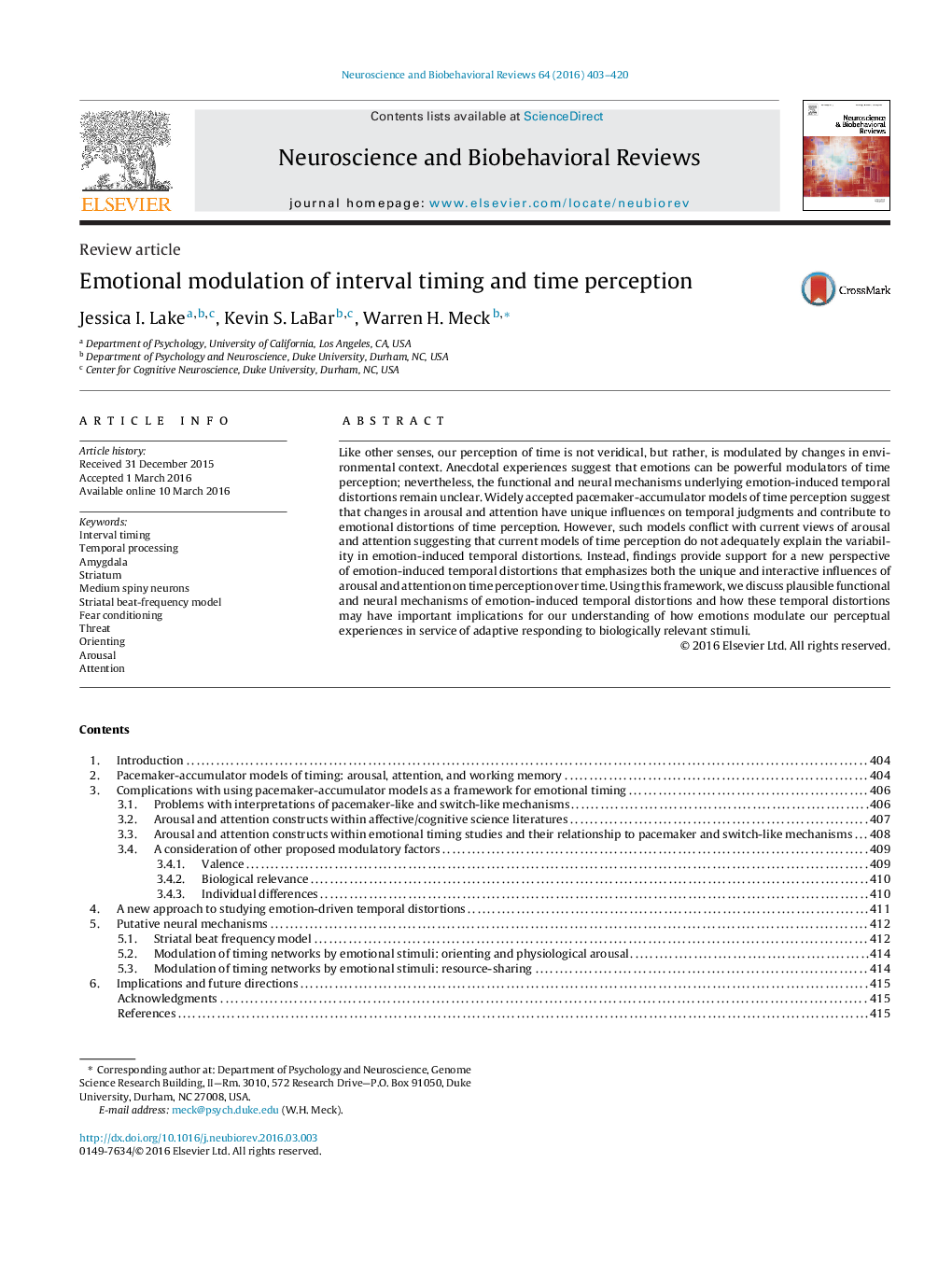| کد مقاله | کد نشریه | سال انتشار | مقاله انگلیسی | نسخه تمام متن |
|---|---|---|---|---|
| 7303069 | 1475306 | 2016 | 18 صفحه PDF | دانلود رایگان |
عنوان انگلیسی مقاله ISI
Emotional modulation of interval timing and time perception
ترجمه فارسی عنوان
مدولاسیون احساسی زمانبندی فاصله و ادراک زمان
دانلود مقاله + سفارش ترجمه
دانلود مقاله ISI انگلیسی
رایگان برای ایرانیان
کلمات کلیدی
ترجمه چکیده
همانند سایر حواس، ادراک ما از زمان، اعتبار ناپذیر نیست، بلکه تغییرات در محیط زیستی مدولاسیون شده است. تجربیات حسی نشان می دهد که احساسات می تواند مدولاتور قدرتمند درک زمان باشد؛ با این وجود، سازوکارهای عملکردی و عصبی ناشی از تحریفات زمانی ناشی از احساسات هنوز معلوم نیست. مدلهای شارژر باتری به طور گسترده ای پذیرفته شده از زمان در نظر گرفته می شود که تغییرات در هیجان و توجه تاثیر منحصر به فردی بر قضاوت های زمانی دارند و موجب تحریف عاطفی در درک زمان می شوند. با این حال، چنین مدل هایی با دیدگاه های جاری از تحریک و توجه مواجه می شوند که نشان می دهد که مدل های کنونی ادراک زمان، تغییرات در تحریف های زمانی ناشی از احساسات را به طور مناسب توضیح نمی دهند. در عوض، یافته های ارائه دهنده پشتیبانی از دیدگاه جدیدی از تحریفات زمانی ناشی از احساسات است که بر تأثیرات منحصر به فرد و تعاملی اشعه و توجه در درک زمان در طول زمان تأکید می کند. با استفاده از این چارچوب، ما در مورد مکانیسم های کاربردی و عصبی قابل اعتماد از تحریفات زمانی ناشی از احساسات ناشی از احساسات و نحوه این اعوجاج های موقتی ممکن است پیامدهای مهمی برای درک ما از چگونگی تجارب ادراکی ما در ادغام پاسخ سازگار به محرک های مرتبط با زیست شناختی داشته باشیم.
موضوعات مرتبط
علوم زیستی و بیوفناوری
علم عصب شناسی
علوم اعصاب رفتاری
چکیده انگلیسی
Like other senses, our perception of time is not veridical, but rather, is modulated by changes in environmental context. Anecdotal experiences suggest that emotions can be powerful modulators of time perception; nevertheless, the functional and neural mechanisms underlying emotion-induced temporal distortions remain unclear. Widely accepted pacemaker-accumulator models of time perception suggest that changes in arousal and attention have unique influences on temporal judgments and contribute to emotional distortions of time perception. However, such models conflict with current views of arousal and attention suggesting that current models of time perception do not adequately explain the variability in emotion-induced temporal distortions. Instead, findings provide support for a new perspective of emotion-induced temporal distortions that emphasizes both the unique and interactive influences of arousal and attention on time perception over time. Using this framework, we discuss plausible functional and neural mechanisms of emotion-induced temporal distortions and how these temporal distortions may have important implications for our understanding of how emotions modulate our perceptual experiences in service of adaptive responding to biologically relevant stimuli.
ناشر
Database: Elsevier - ScienceDirect (ساینس دایرکت)
Journal: Neuroscience & Biobehavioral Reviews - Volume 64, May 2016, Pages 403-420
Journal: Neuroscience & Biobehavioral Reviews - Volume 64, May 2016, Pages 403-420
نویسندگان
Jessica I. Lake, Kevin S. LaBar, Warren H. Meck,
